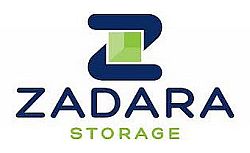Cloud Block Storage
All the features, functionality and security of an onsite storage array in the public cloud.
As the UK's first consulting partner for Zadara Storage, Envertica will work with you to define the most efficient way to migrate and configure your cloud ready business applications. Benefiting from cloud economics and in conjuction with industry leading MSP's you will enjoy enhanced performance, control, availability and privacy without the need to re-architect your application.
 Zadara Storage offers enterprise-class storage for the cloud in the form of Storage as a Service (STaaS).
Zadara Storage offers enterprise-class storage for the cloud in the form of Storage as a Service (STaaS).
Zadara Virtual Private Storage Arrays (VPSAs) are designed especially for demanding applications which require more than basic cloud block storage. They deliver all the features, functionality and security of an onsite storage array in the public cloud.
VPSA™ is the first and only subscription offering to allow IaaS cloud customers to create, custom-tailor and use Enterprise class Virtual Private Storage Arrays and pay for them by the hour. VPSAs are designed from the ground up for the Cloud.
By combining the best of Enterprise SAN, NAS and Cloud Storage (Predictable Performance, scale, reliability and privacy) they finally put an end to the Cloud migration dilemma. Even security is addressed, with data-at-rest and inflight encryption, data privacy is assured because you own and manage your keys. Adopting a cloud strategy should no longer be a case of if but when.
How Does It Work?
Zadara VPSAs turn standard servers and drives into feature rich, Enterprise-class, well-isolated Virtual Private Storage Arrays with predictable performance.
They give you complete control over your storage. You can select the throughput (cores and memory), the types of drives you fully own (SSD or SAS), the level of data protection (RAID 1, 5, 6, 10, 50 or 60) and the network bandwidth.
Better yet, VPSAs provide zero-impact snapshots with consistency groups, for quick and easy backup and recovery, remote replication, full clone, thin provisioning and full graphical performance logging, so that you can tune your application performance in seconds.
With this offering, you need no longer hesitate to move demanding Enterprise and web applications to the Cloud.
How Is It Different?
Zadara Virtual Private Storage Arrays combine innovative software with standard hardware to create truly private Cloud storage with your own dedicated drives, CPUs, memory and I/O. Even though the Cloud is a shared environment, your dedicated resources are isolated from (and not shared with) other Cloud users, resulting in both privacy and predictable performance.
Virtual Controllers (VCs) manage and present storage, ensuring high availability, security and performance. The Virtual Controllers intelligently place and protect your data on Storage Nodes to yield both predictable performance™ and Enterprise-class high availability.
Zadara delivers a private array in the public cloud.
Understanding The Added Features & Benefits
Network Attached Storage (NAS) as a Service in the Cloud
The Zadara™ Storage VPSA™ (Virtual Private Storage Array™) technology looks, performs and behaves like an Enterprise NAS appliance - with an NFS server, dual HA controllers, dedicated high performance drives and Enterprise class NAS features - but is offered as a service in a pay-per-usage service.
What you should expect: Availability, scalability, performance, consistency, protection and management efficiency for business critical applications and big data.
Why it's even better: Total flexibility, multi-tenant architecture, elasticity and reduction of total cost of ownership (TCO).
Application Clustering in the Public Cloud
Most IT professionals choose to run their database in a clustered configuration because of the enhanced availability such a configuration provides. Sadly, application clustering cannot be implemented in most Public Clouds due to storage and networking limitations. Disaster Recovery is also a requirement but historically expensive and complex.
Zadara™ Storage, in partnership with Sanbolic® and InMage eliminate this roadblock and enable application clustering and disaster recovery in the Public Cloud.
In order to implement application clustering, one needs to satisfy four requirements:
- Multiple servers on which to run the application cluster
- Application failover to maintain uptime in the event of server failure (by failing over from a failed application to a working one)
- Shared storage to allow all servers to access the same dataset, and...
- Persistent reservation of the shared storage to prevent conflicting writes to the common dataset
Sanbolic and Zadara Storage deliver enterprise-class storage with application clustering, via the world's leading Public Cloud Providers. This joint offering enables customers to extend the availability, scalability, performance, protection and management efficiency of business critical applications and data, while dramatically increasing flexibility and reducing the total cost of ownership (TCO).
In order to implement application disaster recovery, one needs to satisfy three requirements:
- Cloud Servers for failover that can be launched when failover is needed
- Replication to the cloud software that can produce consistent snapshots that could be mounted in the cloud at any time.
- Cloud Block Storage that looks similar and has the same performance of on premise SANs, that can be the target of the replication and mounted by cloud servers at DR time.
InMage and Zadara Storage deliver enterprise-class disaster recovery to the cloud, via the world's leading Public Cloud Providers. This joint offering enables customers to create an affordable and OPEX oriented disaster recovery strategy that extends the availability, scalability, performance, protection and management efficiency of business critical applications and data, while dramatically increasing flexibility and reducing the total cost of ownership (TCO).
If you are considering a Cloud strategy for your business please contact one of our team on 01285 610038 and share your thoughts and challenges with a consultant.
